Are you excited about grammar? Have you ever read the dictionary for fun? Do you become enthralled by your textbooks?
Whether you are a language nerd or not, crossword puzzles are here to help.
In this article, you will find dozens of exciting puzzle resources to support your learning. You will also learn about the history of this mindful activity and how it can enhance your language studies. So, sharpen your pencil, and let’s get started!
❓ What Is a Crossword Puzzle?
A crossword puzzle is a graphic diagram consisting of horizontal and vertical sections. Each section is divided into squares.
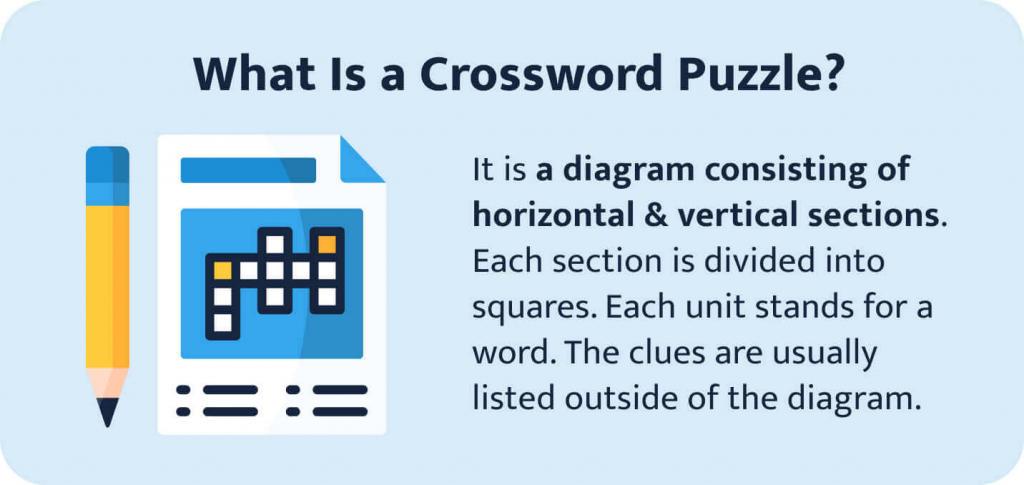
Each unit stands for a word, and each square corresponds to one letter of the word. To guess the right letters, you have clues listed outside of the diagram. The numbered clues are distributed in two groups: one for the horizontal words and one for the vertical ones.
To solve a crossword puzzle, you should:
- Read a clue;
- Guess the word described;
- Find the respective section number in the diagram;
- Write it in the white squares.
Repeat the same actions with all clues.
5 Main Types of Crosswords
- An American-style grid is square and symmetric in all directions. If you rotate the paper, it will look the same from all sides. These grids are usually thematic, making them a perfect choice for educational purposes.
- A British-style grid does not limit its creator to each letter read horizontally and vertically. Some squares are black, forbidding you to write any letters there. The clues are less tricky than in an American-style grid.
- A cryptic puzzle looks like a British-style grid, but its clues are vague and have many interpretations.
- A barred grid divides the words with bold bars, not black squares. It may be uncomfortable for people with poor eyesight.
- Diagramless crosswords do not indicate the right places to insert the word corresponding to the clue number. You should figure out where to put the large words, moving to the smallest ones.
💂 Origins & History of Crosswords
The first crosswords appeared in 19th-century England. They were too simple to be called an adult brain-teaser and derived from a square with words that read in all directions. In fact, these “magic squares” were used in ancient Pompeii as amulets that cured diseases.
Crossword puzzles, as we know them today, were invented in America by Arthur Wynne from Liverpool. Most likely, he drew inspiration from the rudimentary British word puzzles (mentioned above) and Latin palindromes. Wynne made the clues mysterious and complicated, for example, “What we all should be” or “One.”
On December 21, 1913, a diamond-shaped crossword with an open center appeared in the Christmas edition of the New York World. It was entitled “FUN’s Word-Cross Puzzle.” In a later edition, an illustrator happened to mix the words and wrote “Cross-Word,” but the inventor never objected. So, the new term was coined. Other American newspapers started using the idea, and by the late 1920s, not a single printed edition was published without a word puzzle.
Richard Simon and M. Lincoln Schuster published the first collection of crosswords in 1924. The book came with a free pencil as a bonus. More than 100,000 copies were sold.
👨🎓️ Crossword Puzzles as a Learning Tool
Crossword puzzles have proved to be an efficient self-learning tool in pharmacology. They expand your vocabulary, enhance your thinking and learning capacity, and make you more confident. Studies suggest that crosswords are most effective for disciplines that require extensive professional vocabularies. For example, you can learn languages, medicine, natural and social sciences, history, and even music by solving word puzzles.
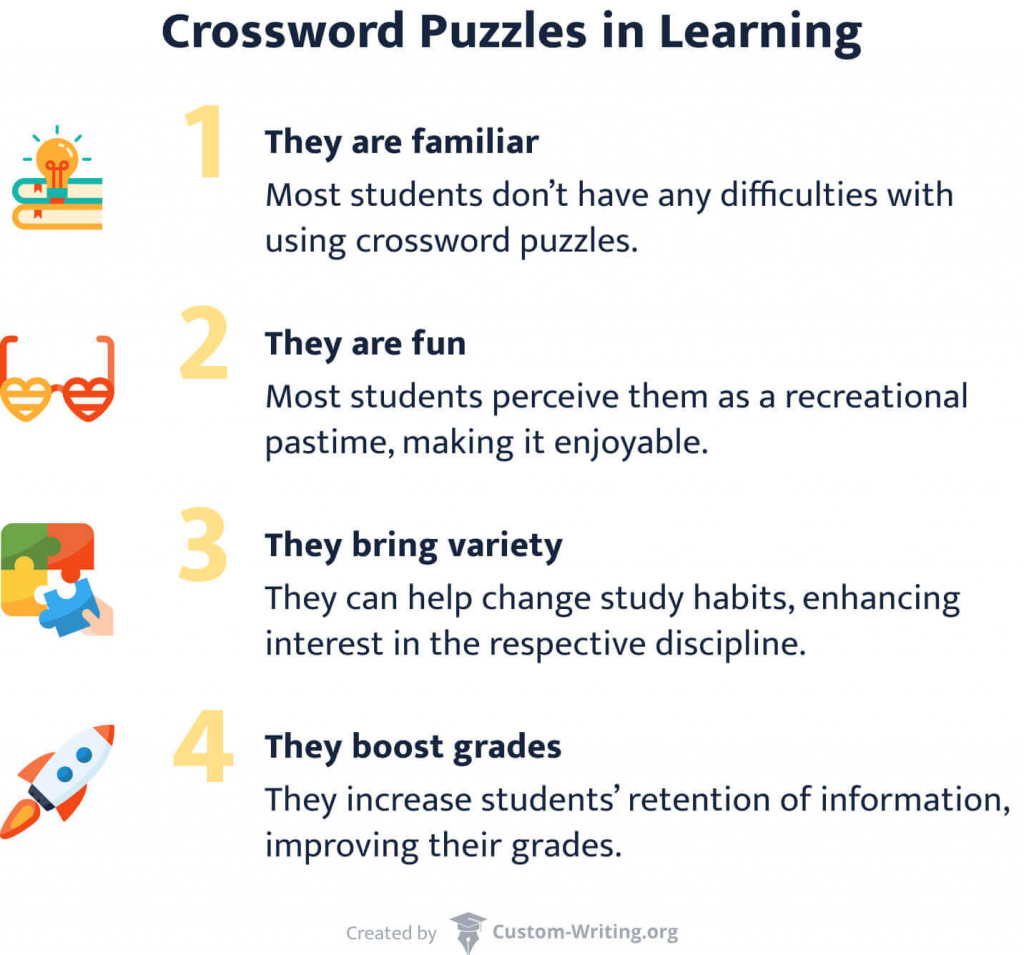
Furthermore, research carried out at Utah State University showed that crosswords have perfect teaching potential because:
- Most students know how to use them;
- Most students perceive them as a recreational pastime, making it enjoyable;
- They can help change study habits, enhancing interest in the respective discipline;
- They increase students’ retention of information, improving their grades.
Crossword puzzles are virtually the same thing as those dull questions at the end of each chapter in your textbook. Yet, they are exciting, providing sufficient challenge and reward. After all, a puzzle is a game, right?
🌐 Crossword Puzzles for Learning: 29 Resources
The 29 resources below can be divided into four categories: online books, paper books, websites, and apps featuring crossword puzzles. We grouped them by discipline, namely foreign languages, history, social sciences, natural sciences, and medicine. Most of them are free (unconditionally or upon subscription), but some require a small payment.
Languages
Crossword puzzles consist of words. Languages also consist of words. It stands to reason that you can learn a foreign language by solving puzzles. Below we have collected the best websites, books, and apps for English, Spanish, French, and German learners.
English as a Second Language
Websites
- Crossword Games group its puzzles by topic: animals, sports, employment, science, arts, health, food, and business. That’s all an English learner needs!
- Crossword Puzzles let you train every possible part of speech. Check out their “Very Common Words” category.
Books
- If you need a free online book, here it is: Vocabulary Games and Activities. This resource is priceless, containing more than just crosswords. Gap-fill sentences, word search, mixed letters, and mixed sentences will elevate your English vocabulary and grammar. Each task comes with a solution on the next page, which is convenient if you print out the book.
- Easy ESL Crossword Puzzles are an inexpensive but fun way to build your language skills. The book contains 110 puzzles featuring over 3000 unique words. Its Amazon rating is 4.3 out of 5.
- Funster Crossword Puzzle Book for Adults is an even more cost-effective choice. The 101 large-print crossword puzzles will inspire your language-learning and save your eyesight. The book contains links to free downloadable sudoku and word search puzzles. It rates 4.6 out of 5 on Amazon.
Apps
There’s no need for a pencil: download an app and solve crossword puzzles on your mobile device. People spend several hours a day flipping through their newsfeed while on their way to work or college. Instead, use that time wisely with the following apps.
- World’s Biggest Crossword (iOS and Android) features seven game modes to diversify your experience. The app’s name has been chosen for a good reason: it has over 10 000 puzzles. Win trophies, achieve new levels, complete quests, and improve your English, all at once.
- CodyCross (iOS and Android) is a cute and colorful game with a well-thought-out system of incentives. You can earn tokens and spend them later on more challenging puzzles. The app has weekly updates, so you will always have new puzzles to solve.
- Word Search (Android) or Wordhub (iOS) are totally free apps, well-packed with all sorts of word games (more than 50). There are many exciting playing modes, like multiplayer, arcade, and story. The daily word challenge is the perfect motivator to keep raising your level.
Spanish
If you are learning Spanish, the websites below will be quite a find for you. Their difficulty levels range from beginner to advance. Let us find those horizontales y verticales.
- The words in Fun Trivia do not presuppose the use of accent marks, making it much easier (and more exciting) for a beginner. The puzzles are bilingual, i.e., if the clues are in English, the answers are in Spanish, and vice versa.
- Surface Languages is a selection of Spanish word searches and crosswords that use the same word bank. Practicing the same words in two different quizzes offers repetition, which can help solidify your knowledge.
- Lexisrex offers a small but helpful selection of word games, including crosswords, multiple-choice, hangman, word bingo, and more. You can explore other word learning resources, available via the left panel of the website.
French
Voulez-vous jouer? French words are not as complicated as French pronunciation. The websites below will help you build your French vocabulary with ease.
- LanguagesOnline features interactive crosswords for French students. They were designed as end-of-year activities for schoolchildren but are also perfect for beginners. The tasks have buttons with accented letters, meaning that you can use your English keyboard.
- On LCI.fr you can find thousands of French crossword puzzles. Each task has a difficulty level (1 to 3), but all the clues are in French. You will need a sufficient level of knowledge to navigate and complete the puzzles.
- iCroisés Mots is an iOS app for French learners wanting to extend their vocabulary knowledge. The app is paid (3.99 Euro), but the choice of crossword puzzles is worth the price.
German
German is spoken by more than 155 million people worldwide. It is an excellent choice for second-language learning. Explore the resources below because heute ist ein wunderbarer Tag zum Lernen.
- Deutschtrainer A1 (iOS or Android) is a free app designed by Goethe-Institut for beginners. The quiz words correspond to the German A1 Exam. They comprise such topics as vegetables, numbers, family members, traveling, and more. Each chapter offers a different task to train your language skills. For instance, you may listen to a dialogue and then solve a crossword based on its vocabulary.
- ABCteach is an online educational resource for homeschooling and teachers. You will have to get a free account to access most of the quizzes. The crosswords are grouped by topic.
- This Android app is not that visually appealing but is a reliable and infinite source of crossword puzzles in German. There is no translation into other languages. The quizzes require sufficient knowledge of the language.
History & Social Sciences
Who could remember all the kings of England? Only those who practice solving historical puzzles. The resources below will help you memorize the names of famous people and places.
- Ducksters is a website full of crossword puzzles on a number of school disciplines: history, geography, and science, to name a few. It is an excellent way to practice ahead of an exam, especially as it is free.
- New York Times has collected the best students’ crosswords on history, economy, language arts, civics, and other subjects. The archive is enormous, offering you days of enjoyable and intellectual activity. At the beginning of the article, there is an informative video explaining how crosswords are made. “It’s a helpful addition that’s going to make you more capable of tackling life,” the New York Times Crossword Editor says.
- Crossword Hobbyist offers thousands of free printable crosswords on World History. The periods covered include the Enlightenment, Rennaissance, Chinese History, Greek History, etc. The website has other resources, some of which are paid. For example, you can try to make your own word puzzle here.
- A key resource is Master the Essential Vocabulary of the AP World History Exam. For only $14.99, you can get a book full of crosswords on each historical period in human civilization. The editors use ‘insider’s language’ for each discipline to ensure you are as prepared as possible for the exam.
Natural Sciences
Natural sciences explore the rules of the universe and the impact of human presence on the planet. Most people think of chemistry, biology, and physics, but ecology, geophysics, and biochemistry are also in this group. Here are some resources to make these serious subjects more fun.
- Learn-Biology.com offers sets of crossword puzzles on biology vocabulary. They are very interactive, and there is no need to print anything.
- Creative-Chemistry.org.uk classifies crosswords by topic: fossil fuels, chemical families, organic chemistry, etc. The interactive interface allows you to reveal words you do not know or suggest one letter as a hint.
- These science and technology crosswords focus on English vocabulary. Move from the easiest to the most complicated puzzles to enhance your knowledge.
Medicine
Do you know why medical students study longer than their peers in other disciplines? Medicine is the most professional vocabulary-intense sphere of human knowledge. Here is how you could train your brain to recognize symptoms and illnesses without thinking.
- MedicalGiftGuide features free downloadable word puzzles on general medical terminology. Most of them are related to surgery, but there are also some on radiology and obstetrics.
- Jama Network have published a selection of crosswords designed by New York Times creators.
- Medi-Cross is a book of crosswords for medical and nursing students, massage therapists, and other scientists and practitioners in healthcare. It is a one-of-a-kind American-style collection of medical crosswords, so be sure to try it out.
- A cheaper alternative to Medi-Cross, Medical Crosswords challenges you with the question: “So you think you can be a doctor?” Prove them you can. It is a must-do before final medical exams.
Crosswords are a perfect way to gamify your studies and test your knowledge. We hope that you have found some word puzzles that meet your needs and preferences. If you know of other crossword resources, please share them in the comments.
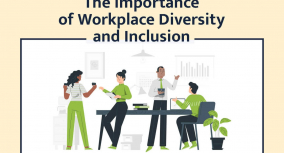

![Changing Career Paths after Graduation… or Later [Guide + Infographic]](https://custom-writing.org/blog/wp-content/uploads/2021/09/Changing-Career-Paths-after-Graduation-or-Later-284x153.jpg)
![Being a Successful Online Student: 6 Must-Have Skills [Infographic]](https://custom-writing.org/blog/wp-content/uploads/2021/09/Being-a-Successful-Online-Student-284x153.jpg)

![Meeting Deadlines: A Comprehensive Guide [Tips & Infographic]](https://custom-writing.org/blog/wp-content/uploads/2021/07/flat-lay-desk-calendar-clock-284x153.jpg)
![Getting the Most Out of Career Fairs [The Complete Guide]](https://custom-writing.org/blog/wp-content/uploads/2021/07/company-representatives-reading-applicant-resume-hiring-284x153.jpg)
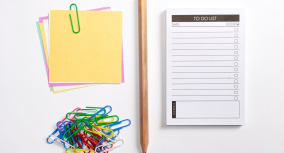
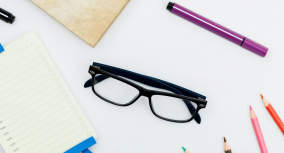



What an awesome collection of educational resources on many interesting topics for both adults and kids of all ages!
love this comprehensive piece on crosswords and their role in learning! I especially loved finding puzzles in Spanish so I can brush up and enjoy it!
Great collection of resources. I did crossword puzzles starting in childhood, and they made me highly aware of the meaning and power of words.